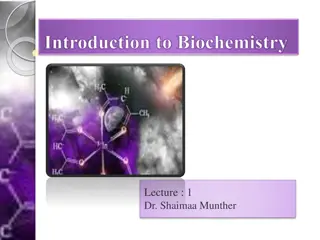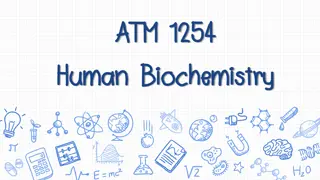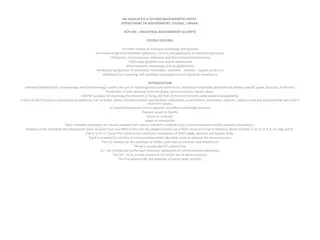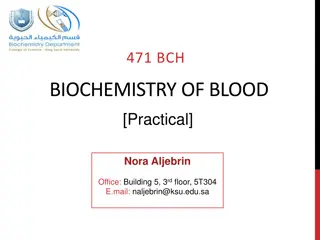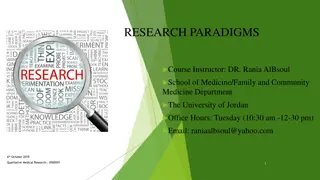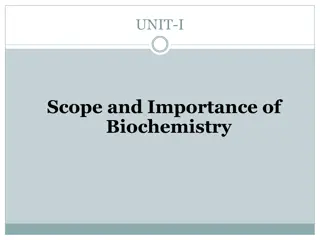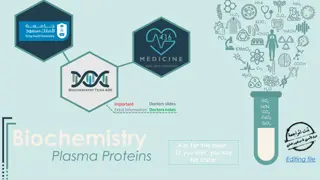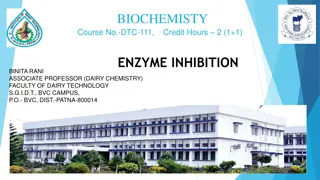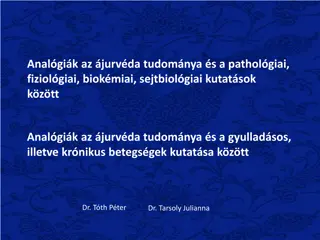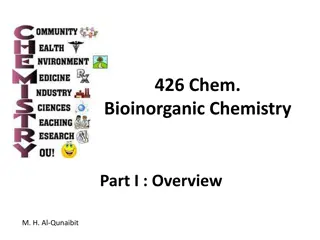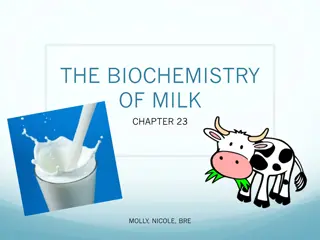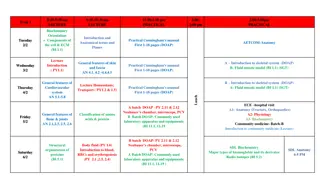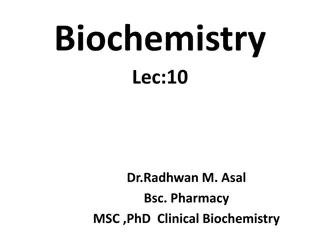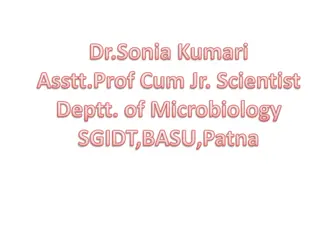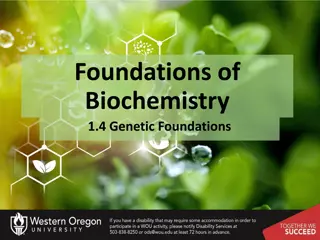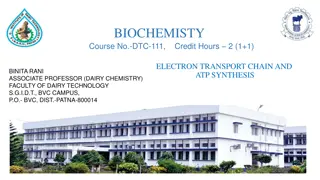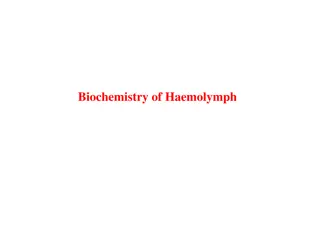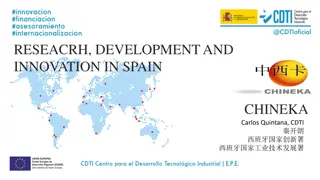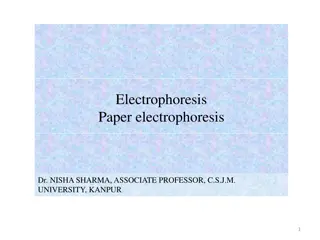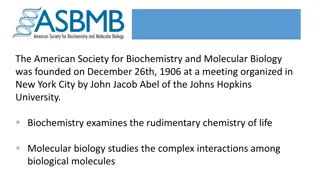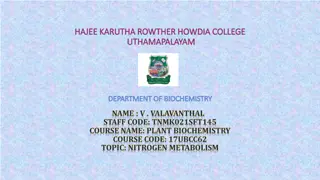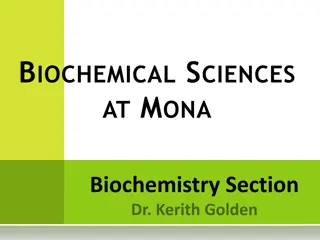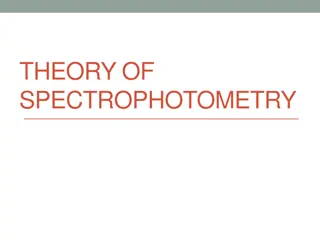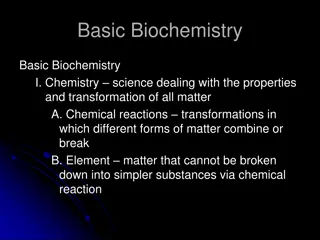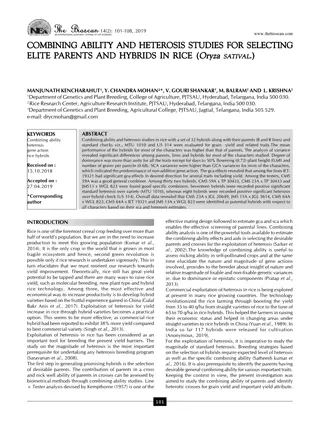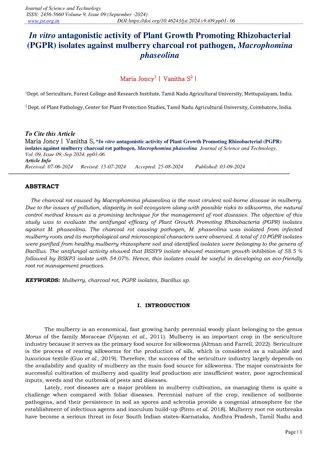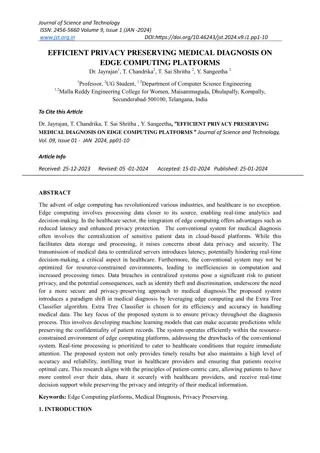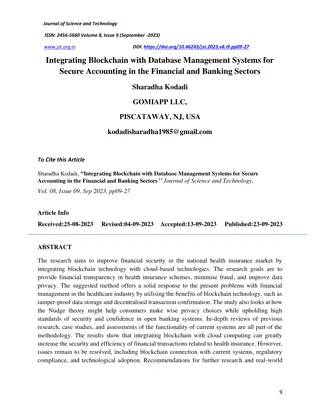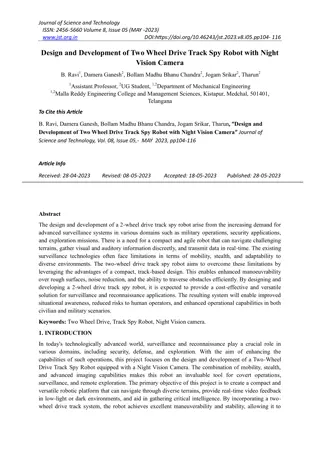Introduction to Biochemistry: Understanding the Chemistry of Life
Biochemistry is the science that delves into the chemical basis of life, focusing on cellular components, biomolecules, metabolism, gene expression, and more. Understanding biochemistry is crucial for comprehending the molecular processes associated with living cells, both in health and disease.
7 views • 58 slides
Exploring Human Biochemistry: Anatomy, Systems, and Diseases
Delve into the intricate world of human biochemistry through a comprehensive exploration of the anatomy, systems, and diseases affecting the body. From the respiratory and circulatory systems to discussions on common ailments like colds, influenza, and pneumonia, this content provides an insightful
4 views • 42 slides
UCC Research Support and Strategies Overview
UCC's Research Support, Policy & Strategy function, led by David O'Connell, PhD, provides comprehensive support for research activities at the university. The office manages research funding, monitors performance, and facilitates engagement with external stakeholders. UCC's involvement in Horizon Eu
3 views • 17 slides
Overview of Industrial Biochemistry and Biotechnology
This course outline covers key topics in industrial biochemistry, microbiology, and biotechnology, focusing on the use of microorganisms and molecules to achieve specific goals in production processes. It delves into microbial physiology, genetics, metabolic pathways, enzymes, microbial growth, ferm
0 views • 10 slides
Biochemistry of Blood Practical Course Overview
This biochemistry of blood practical course involves various experiments focusing on blood components such as plasma, serum, proteins, enzymes, blood groups, hemoglobin, glucose levels, and more. The course outline includes detailed experiments, marking distribution, guidelines for writing scientifi
3 views • 6 slides
Overview of Research Problem Identification and Formulation
Understanding the importance of defining a research problem, this content delves into the selection and formulation of research problems, the definition of a research problem, reasons for defining it, methods for identifying research problems, sources of research problems, and considerations in sele
1 views • 11 slides
Understanding Research Paradigms in Qualitative Medical Research
Delve into the world of research paradigms in qualitative medical research with a focus on the key differences between objective and subjective research, the meaning of research paradigms, components of research paradigms, types of research paradigms, and how paradigms guide the selection of researc
0 views • 42 slides
Understanding the Scope and Importance of Biochemistry
Biochemistry is a crucial field that delves into the chemical processes of living organisms at a cellular and molecular level. It aids in understanding diseases, molecular interactions, metabolism, and the origins of life. By studying the structure and function of complex molecules, biochemistry for
3 views • 19 slides
Guidelines for Selecting Research Project Topics in Environmental Health
Research is crucial for addressing environmental health issues. Choosing a good research topic is the first step towards effective research. This paper discusses the meaning, characteristics, types of research, and the research process to help in selecting appropriate research topics. Understanding
0 views • 15 slides
Understanding Transamination and Deamination in Biochemistry
Transamination is a vital chemical reaction in biochemistry that transfers amino groups to ketoacids to form new amino acids, playing a crucial role in amino acid metabolism. Enzymes called transaminases facilitate this process, utilizing -ketoglutarate as a key amino group acceptor. The mechanism i
5 views • 17 slides
Understanding Plasma Proteins in Biochemistry Lectures
This informative content discusses the types, functions, and measurement of plasma proteins in biochemistry. It covers the importance of identifying various plasma proteins, their roles in disease diagnosis, and the interpretation of electrophoretic patterns. The lecture overview provides insights i
0 views • 30 slides
Understanding Enzyme Inhibition in Biochemistry
Enzyme inhibition plays a crucial role in pharmacology and biochemistry by regulating enzymatic reactions. Inhibitors can be reversible or irreversible, affecting enzyme activity differently. Competitive, uncompetitive, and noncompetitive inhibition types are explained along with examples like diiso
0 views • 20 slides
Integration of Ayurveda in Modern Medicine Clinical Practice
The integration of Ayurveda in modern medicine clinical practice is a growing field focusing on research in pathophysiology, physiology, biochemistry, and cell biology. Ayurveda is being applied to address conditions such as atherosclerosis, stroke, dementia, Parkinson's disease, autoimmune rheumato
0 views • 17 slides
Exploring Bioinorganic Chemistry: Connecting Inorganic and Biochemistry
Bioinorganic Chemistry bridges the gap between inorganic chemistry and biochemistry, understanding the vital role of inorganic elements in living systems. This interdisciplinary field delves into the structure, function, and exploitation of metal ions in biological processes, emphasizing their inter
0 views • 47 slides
Exploring the Biochemistry of Milk: Components, Processing, and Health Benefits
Delve into the intricate world of milk biochemistry with a focus on its components, processing methods, and health implications. Learn about the proteins, fats, carbohydrates, minerals, and vitamins present in milk, as well as how they contribute to its complex nature. Discover the various processes
0 views • 15 slides
Biochemistry Orientation, Cell Components, Anatomical Terms, and Practical Sessions Week 1
Delve into the world of Biochemistry with an orientation on cell components and the Extracellular Matrix (ECM). Explore anatomical terms and planes, setting the foundation for further learning. Engage in practical sessions using Cunningham's manual for hands-on experience in the field. Week 1 is pac
0 views • 38 slides
Understanding Lipid Biochemistry: A Comprehensive Overview
Lipids are a diverse group of compounds crucial for various biological functions. They include fats, oils, steroids, and waxes with unique properties essential for energy storage, insulation, and nerve function. Knowledge of lipid biochemistry is pivotal in understanding areas like obesity, diabetes
0 views • 38 slides
Post-Production Processing of Yogurt: Types and Biochemistry
Dr. Sonia Kumari, Asst. Prof. & Jr. Scientist in Microbiology, outlines the various types of post-production processing for yogurt including pasteurized, liquid, carbonated, frozen, dietetic, and probiotic yogurts. She details the nutritional facts and types of probiotic yogurts available, discussin
0 views • 11 slides
Tips for Successful Biochemistry Exam Preparation
Prepare effectively for your biochemistry exams by creating a realistic study timetable, practicing smart revision techniques, utilizing your time wisely, watching lectures, making notes, and focusing on key concepts. Don't stress over extra reading; only focus on topics you don't understand. When w
0 views • 20 slides
Understanding Genetic Foundations and Protein Production in Biochemistry
Exploring the genetic foundations of biochemistry reveals how organisms evolve through natural selection and how phenotype and genotype are interconnected. The process of gene expression plays a crucial role in determining an organism's phenotype. Additionally, protein production through translation
0 views • 17 slides
Understanding Electron Transport Chain and ATP Synthesis in Biochemistry
This course delves into the intricacies of electron transport and oxidative phosphorylation in biochemistry, elucidating how NADH and FADH2 are re-oxidized to generate ATP in eukaryotes and prokaryotes. It explores redox potential, oxidation-reduction reactions, and the role of standard redox potent
0 views • 20 slides
Understanding the Biochemistry of Insect Hemolymph
Insect hemolymph, also known as blood, plays a crucial role in maintaining the tissues throughout the body. It consists of plasma containing hemocytes suspended in a fluid rich in various chemicals. The pH of the hemolymph ranges between 6.4 and 6.8, with variations in volume across different insect
0 views • 9 slides
Understanding Agarose Gel Electrophoresis in Biochemistry and Molecular Biology
Agarose gel electrophoresis is a technique used to separate and analyze DNA or RNA molecules based on size in biochemistry and molecular biology. It involves applying an electric field to move molecules through an agarose matrix towards the positive electrode, with larger molecules moving slower tha
0 views • 11 slides
Research, Development, and Innovation in Spain - Overview
Spain's R&D system is supported by various institutions and strategies focusing on science, technology, and innovation. The country ranks well globally in scientific production, with a strong emphasis on medicine, biochemistry, engineering, physics, and agriculture. Spanish enterprises are at the fo
0 views • 15 slides
Understanding Paper Electrophoresis in Biochemistry Research
Paper electrophoresis is a powerful technique used in biochemistry to separate charged particles like proteins based on their migration along a filter paper strip. This method, conducted by Dr. Nisha Sharma, an Associate Professor at C.S.J.M. University in Kanpur, involves applying samples to the pa
0 views • 17 slides
The American Society for Biochemistry and Molecular Biology - Advancing Research in Life Sciences
Founded in 1906, the American Society for Biochemistry and Molecular Biology (ASBMB) is a prominent organization that explores the fundamental chemistry of life and intricate interactions among biological molecules. ASBMB publishes prestigious research journals covering various fields such as microb
0 views • 5 slides
Biochemistry 1 Final Exam Review Spring 2023 SI Leader: Kaitlyn Jade Ong
Review materials for the Biochemistry 1 final exam include topics on membrane transport, lipid structures, melting points of fatty acids, calcium transport mechanisms, Na⁺-K⁺-ATPase classification, adenylate cyclase signaling pathway regulation, and Ras signaling pathway proteins inactivation.
0 views • 14 slides
The Role of Nitrogen in Plant Biochemistry: Understanding Nitrogen Metabolism
Nitrogen is a crucial element in plant biochemistry, essential for protein synthesis and the formation of various organic compounds. This article explores the sources of nitrogen available to plants, including atmospheric nitrogen, nitrates, and organic nitrogen compounds. The importance of nitrogen
0 views • 15 slides
Biochemistry and Chemistry Elective Courses Overview at SRCASW
The Shaheed Rajguru College of Applied Sciences for Women offers elective courses in Biochemistry and Chemistry. The Biochemistry course covers biomolecules like amino acids, proteins, carbohydrates, lipids, and nucleic acids, emphasizing their properties and functions. It also includes practical ex
0 views • 19 slides
Department of Biochemical Sciences at MONA: Biochemistry Section, Academic Staff, Research Highlights, and Courses Offered
Explore the prestigious Department of Biochemical Sciences at MONA, specializing in Biochemistry, Anatomy, Physiology, Pharmacology, Physical Therapy, and Dentistry. Learn about the dedicated academic staff, research highlights in medical and plant biochemistry, and offered degrees. Discover the com
0 views • 11 slides
Protein Purification Protocol: Practical Training in Biochemistry Techniques
This protein purification protocol course, led by Dr. Samina Hyder Haq, focuses on practical training in various biochemistry techniques. The course covers organizing experimental protocols, protein isolation strategies, sequential enzyme purification, enzyme kinetics, and writing scientific reports
0 views • 25 slides
Understanding Spectrophotometry: Principles and Applications
Spectrophotometry is a valuable method for measuring the absorption of light by chemical substances, aiding in quantitative analysis in various fields such as chemistry, biochemistry, and clinical applications. This technique involves utilizing spectrophotometers to detect the intensity of light abs
0 views • 21 slides
Understanding Basic Biochemistry: Matter, Elements, and Atom Structure
Basic Biochemistry explores the science of matter, chemical reactions, elements, and atom structure. It covers the properties and transformations of matter, the significance of essential elements for life, and the structure of atoms including protons, neutrons, and electrons. This foundational knowl
0 views • 50 slides
Exploring Research Design and Funding Priorities in Northern Ireland
Dive into the world of research at the upcoming Application and Research Design Workshop scheduled for Friday, 28th May 2021. Discover the strategic priorities driving impactful research initiatives, learn about current research projects, funding processes, and collaborations. Explore the rich histo
0 views • 37 slides
journal of life sciences research and reviews
The Journal of Life Sciences Research and Reviews is a scientific journal that typically focuses on publishing articles related to various fields within life sciences. These can include topics such as biology, biotechnology, biochemistry, molecular b
0 views • 8 slides
journal of life sciences research and reviews
The Journal of Life Sciences Research and Reviews is a scientific journal that typically focuses on publishing articles related to various fields within life sciences. These can include topics such as biology, biotechnology, biochemistry, molecular b
0 views • 6 slides
journal of life sciences research and reviews
The Journal of Life Sciences Research and Reviews is a scientific journal that typically focuses on publishing articles related to various fields within life sciences. These can include topics such as biology, biotechnology, biochemistry, molecular b
0 views • 10 slides
journal of life sciences research and reviews
The Journal of Life Sciences Research and Reviews is a scientific journal that typically focuses on publishing articles related to various fields within life sciences. These can include topics such as biology, biotechnology, biochemistry, molecular b
0 views • 20 slides
journal of life sciences research and reviews
The Journal of Life Sciences Research and Reviews is a scientific journal that typically focuses on publishing articles related to various fields within life sciences. These can include topics such as biology, biotechnology, biochemistry, molecular b
0 views • 13 slides
Understanding Electrophoresis and Its Applications in Biochemistry
Electrophoresis is a vital process in biochemistry that allows for the separation and analysis of charged molecules based on factors such as net charge, size, and electrical field strength. This technique, commonly used in DNA analysis and protein separation, relies on the migration of charged parti
0 views • 14 slides
